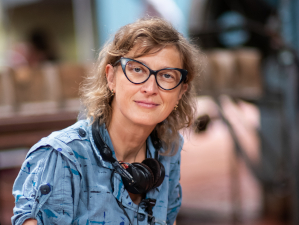Panel discussion: For Those Who Can Tell No Tales
Jasmila Žbanić, Maša Hilcisin Dervišević, Vera Haag Arbenz, Helga Kirchner
In the autumn of 1992 – it’s the middle of the war in Bosnia – Monika Hauser reads of the countless women raped there. She reads that Serbian soldiers convert hotels and factories into brothels where women are kept imprisoned for days or months. She is shocked by the events. She is also outraged about the way the media report the women and thus abuse them a second time.
– medica mondiale
The film For Those Who Can Tell No Tales by Jasmila Žbanić describes a similar experience from the perspective of Australian artist Kym Vercoe – but some time after events. We will therefore be showing beforehand Personal Images: Personal Semiotics of War by Maša Hilčišin-Dervišević. Th e film screening will be followed by a discussion about the way the painful history of women caught up in the Bosnian war has been treated and about the way the victims (as well as we onlookers) deal with these events. For the desire to forget comes out again and again. Can humanity liberate itself of the spectre of such events or is the memory of these and other war crimes still necessary today? These issues will be tackled by Jasmila Žbanić and Maša Hilčišin-Dervišević, the two fi lm-makers, as well as by Vera Haag Arbenz, medica mondiale spokesperson for South-East Europe. Journalist Helga Kirchner will be in the chair.

Jasmila Žbanić
Jasmila Žbanić was born in 1974 in Sarajevo, where she graduated in film and theatre directing from the Academy of Performing Arts. She also worked as a puppeteer in the Vermont-based Bread and Puppets Theater and as a clown in a Lee Delong workshop. Her first feature film Grbavica won the Golden Bear at the Berlinale and countless other international awards. All her films are produced by the artist’s association Deblokada she herself set up. In 2014 she received the KAIROS Prize for outstanding cultural achievement.
Films by Jasmila Žbanić
Airborn 2019 | One Day in Sarajevo 2014 | Love Island 2014 | For Those Who Can Tell No Tales 2013 | Na putu 2010 | Grbavica 2016 | Images From the Corner 2003 | Crvene gumene cizme 2000 | Noc je, mi svijetlimo 1998
Maša Hilcisin Dervišević
Maša Hilcisin Dervišević is a documentary film maker from Bosnia currently living in Prague. Her films, which emphasize social issues and aspects of human rights, have been screened at film festivals around the world. Her film Queer Sarajevo Festival was screened at the IFFF Dortmund+Köln.
Films by Maša Hilcisin Dervišević
A 2012 | Home 2012 | Queer Sarajevo Festival 2008 | Not If You Can But You Must 2006 | Vijecnica 1999
Vera Haag Arbenz
Vera Haag Arbenz studied sociology and economics at the University of Zurich and then worked for a Swiss nongovernmental organization in Kyrgyzstan. Following that, she managed public health projects in Tanzania and India
on behalf of a Swiss foundation. Since 2012, Vera Haag Arbenz has been an advisor at medica mondiale for the region of Southeast Europe, overseeing projects in Bosnia-Herzegovina and Kosovo. In addition to her master’s degree
in sociology, she also gained in 2012 a master’s degree in non-profit management at the Protestant University of Applied Sciences in Darmstadt.
Helga Kirchner
Helga Kirchner began her career on youth radio at WDR Radio, presented morning and midday magazines on air, edited the Critical Journal and contributed to the guest commentary slot on Tagesthemen, ARD TV’s flagship news
programme. She helped develop the WDR radio phone-ins and for the ten years until her retirement, was in charge of the politics desk as radio editor-in-chief. For many years, she chaired the programme advisory committee of the Civis Media Foundation for Integration and Cultural Diversity in Europe. In 2010, the Association of Women Journalists awarded her the Hedwig Dohm Certificate.






